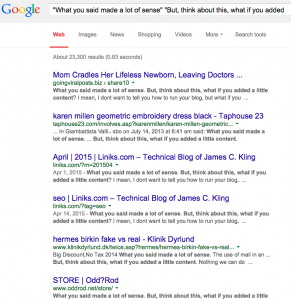Ok. This is my third post and it’s really the first one that has anything to do with the URL “unorthodocs” which I derived from being a doctor and finding my ideas really on the “fringe”. This has been the case for most, if not all, of my career. As a GP I found myself admiring people with so called “borderline personality disorder” when my peers were in a different frame of mind. I became interested in narrative therapy as a very respectful way of dealing with suffering rather than the diagnostic model which believed in chemical deficiencies, ideas of “normal” and “abnormal” and pharmaceutical supplementation. (I’m not dead against this, obviously, but against the overuse of this model, especially when it doesn’t help). In the 1990s I became interested in what we thought then was “food sensitivity” despite much scoffing by some of my peers.
Anyhow, times have changed. The stuff that was scorned is suddenly OK again. Colonic enemas, once quackery, are being reappraised as we contemplate faecal transplants for some conditions now that we have a new of understanding of disease.
The new model is complex. It can’t really be simplified. But here goes (forgive any oversimplification- but it’s not possible to do this simplistically- we really stuffed up previously with oversimplifying eg: “Saturated fat is bad for you”, “cholesterol causes hardening of the arteries” etc.)
We all come with a genetic makeup. Some genes protect us from disease. Some predispose us- there’s a lot of luck here, but diversity is important for survival, so we are not made as clones. This is not new thinking- I’ll get to the new stuff soon.
We also come with a microbiome: that’s bugs in us and on us. (In fact they are mainly “on us” as the gut is technically part of the exterior world, and that’s where the most bacteriae reside).
Our microbiome is unique to each of us. It depends on our early exposure (Caesarean section anyone? Would you like a five-fold increased risk of food allergy with that?). If you are born by vaginal delivery you get a microbiome very much based on your mother’s gut microbiome rather than her skin microbiome. That’s probably good.
Our microbiome is then modified by our lifestyle- predominantly our diet, but also by exercise, antibiotic exposure and other medications that we previously didn’t realise also kill some bugs and favour others.
Our microbiome directly or indirectly alters our metabolism, our desires, food preferences and cravings. (Google “neuropods” if you are interested!). We westerners eat an excess of food. It can also create inflammation in the body, directly starting off processes that underly much of our troublesome diseases.
A healthy diet for you may not be so for me. We have different genes, and they might even be because we are descended from different cultures or geographical areas. We’ve adapted differently. Then add in what might be our uniquely healthy microbiome. Our optimal internal bacterial community will differ depending on whether we are descended from populations whose staple is maize, wheat, rice, millet or others. And it will move and change dynamically with our diet.
The microbiome and disease.
There is lots being written about the microbiome. A lot of it is not new, but a lot is. Rather than write a huge essay, here is a start-
There are some bacteria that are appearing as culprits in the generation of dementia, depression, diabetes, infertility, inflammatory bowel disease. These diseases may be more related than we think. They all involve inflammation. Firmicutes species (some types only) Proteobacteriae and Clostridium difficile seem to appear in the police lineup with suspicious regularity. Currently we have a few suspects, and a lot of crimes. Matching them up will require supercomputing, not conventional research trials.
Anyway, it’s not just the microbiome that’s new on the block in our understanding of disease. There’s a few people around challenging the orthodoxy in our understandings. And their ideas are looking plausible. Some are greatly more plausible than what we doctors thought was fact:
Diabetes and insulin
What if we are wrong about diabetes? What if insulin is as much the problem as it is the solution? What if diabetes is an adaptation to overnutrition? (ie- get so sick you have to stop overeating, and spill glucose into the urine to avoid it being driven into overloaded and inflamed fat cells) If overloaded reserves are the cause of organ damage, treating with insulin may be harmful. Maybe we should be advising increased fat intake and reduced carbohydrate intake (a reliable way of reducing total calories) thereby reducing the need for insulin (see the Ted talk by Peter Attia, or the work of David Lustig, Jimmy Moore’s podcasts, or David Gillespie’s books here, and read them all discerningly- no commentator is perfect.)
Cravings
Still on diet here… what if cravings are mediated by the bacteria, and it’s not just as simple as willpower? What if we are blaming people for a neuropsychoimmunological response that is beyond their control, just like we blamed people for TB before we understood it was caused by a bacteria? (I read an article making this connection, but I can’t find it to make the attribution here)
At medical school we were told about dopamine and cravings. We were told what parts of the brain were involved. We were told about addiction, but we didn’t know about the microbiome and how it might be calling the shots here. We were told that the vagus nerve (brain to gut) was a superhighway with 2/3 of its traffic going from gut to brain, but not why.. no-one really knew.
But back to medicine. We have a number of epidemics currently. Two of the most serious are metabolic syndrome (“diabesity”, “fatflammation”, “carbohydrate-storage-disease” call it what you will) and the second is abuse including domestic violence and sexual abuse. Both have solutions but require paradigm shift. I’ll talk about abuse in another blog.
Suggestion – Change our food guidelines.
I think we should abandon our reductionist dietary guidelines that confuse us by dissecting food down in some semblance of a scientific experiment. We could stop doing trials that distract us from the obvious, and stop trying to control variables that can’t be factored out and ultimately leave studies wide open to criticism. Instead we could adopt sensible National Food Guidelines like Brazil’s. Or just to keep is simple, we could avoid any “food” that doesn’t rot or wasn’t in existence before the industrial revolution- they are most likely not a real food.. more likely a “food like substance”. We should, as Katz found when he compared all diets, eat food, as close to nature as possible with a predominance of fruit, nuts, vegetables and fibre. We should eat just enough to satisfy hunger.
Meat is problematic. Apart from the ethical issues, it’s pretty hard to find meat that isn’t based on grain-fed animals or fish. Grain isn’t great for animals or many humans, but grass fed meat is expensive, less available, and we can’t make enough to feed the world.
I think we should ignore consensus derived guidelines and stick to evidence based recommendations, or if there are none, regress to traditional pre-1900 diets appropriate to our genetics.
Warning- if you are diabetic, always discuss dietary change with your medical team. The following isn’t medical advice.. your doctor is the place for that. I do advise looking at the following ideas and discussing with your trusted doctor.
Hopefully people can find an up-to-date doctor. When this post was written, many doctors hadn’t heard of the microbiome, but now many are familiar. If you have cravings and are not diabetic, have a look into the evidence about withdrawal from sugars and processed carbs (including bread) . It seems likely that healthy fats, nuts and fermented products can assist by reducing the number and power of the bad carb-dependent bacteriae that feed the cravings. Carb withdrawal is becoming pretty popular. Even for type 2 diabetics, who of course will need all dietary changes supervised as insulin is likely start becoming more effective if you start reversing the diabetes. This can lead to hypoglycaemic attacks (hypos) which can be extremely dangerous if medication isn’t adjusted accordingly.
There’s a lot of exciting research being performed and new strategies are emerging to prevent or treat diseases when previously we could only despair our therapeutic impotence. The drug companies are also excited. See this article in Nature. I prefer to be excited about lifestyle and dietary change without popping pills, but each to his/her own. The microbiome will be/ (is, 2019) big, and people aren’t even talking yet about the virome (your average spinach leaf is teeming with viruses which can kill bacteria called phages, and it seems they attack the bacteria that cause us harm). It will take decades to nail the virome and make it into pills, so in the meantime, let’s just stick to green leafy vegetables like grandpa and grandma said.

